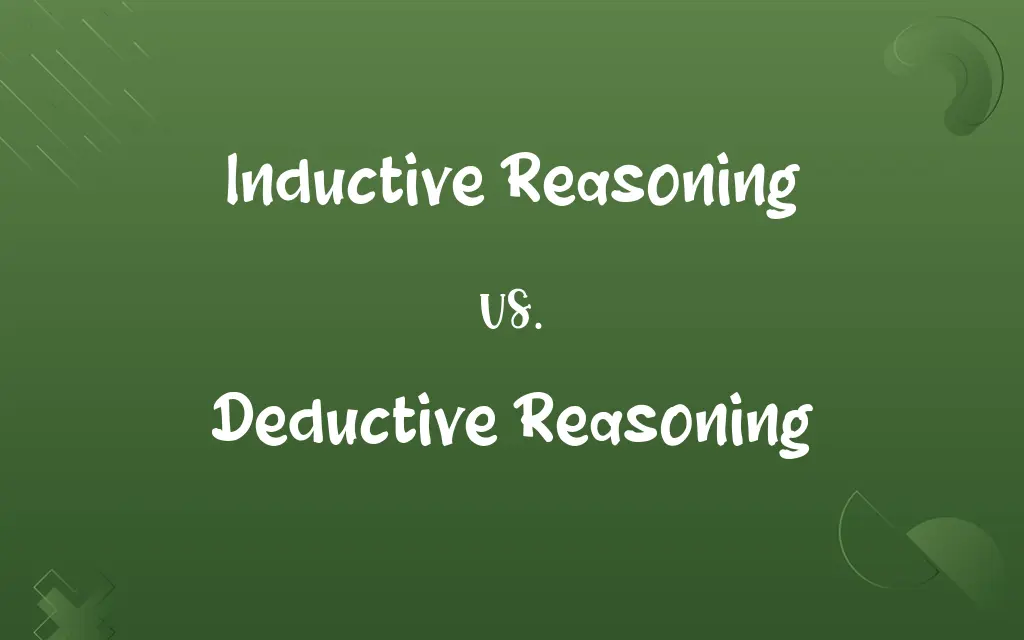Inductive Reasoning vs. Deductive Reasoning: Know the Difference

By Shumaila Saeed || Published on January 21, 2024
Inductive Reasoning involves forming general principles from specific observations; Deductive Reasoning applies general principles to reach specific conclusions.

Key Differences
Inductive Reasoning is a method where observations or specific details lead to a general conclusion. This process involves looking at patterns, trends, or specific instances and then formulating a general rule or principle. Deductive Reasoning, on the other hand, starts with a general statement or hypothesis and examines the possibilities to reach a specific, logical conclusion. It works from the more general to the more specific.
Shumaila Saeed
Jan 21, 2024
In Inductive Reasoning, the conclusions reached are probabilistic, meaning they may seem likely but are not guaranteed to be true. It's akin to making an educated guess based on evidence. For example, observing that the sun rises every morning and concluding that it will rise every day is inductive. Deductive Reasoning is more black and white. If the premises are true, the conclusion must be true. It's like a mathematical proof, where specific conclusions are drawn from general laws or principles.
Shumaila Saeed
Jan 21, 2024
The strength of an Inductive Reasoning argument depends on the strength and representativeness of the observations. More data or diverse examples strengthen the conclusion. However, Deductive Reasoning requires the initial premise to be true for the conclusion to be true. If the general principle is incorrect, the conclusion will be flawed, regardless of the logic applied.
Shumaila Saeed
Jan 21, 2024
Inductive Reasoning is often used in scientific and everyday problem-solving scenarios where patterns or behaviors are observed and theories are developed. It's dynamic and open to revision as new information comes in. Deductive Reasoning is more static and is used in formal logic and mathematics, where the focus is on deducing specific truths from general axioms or principles.
Shumaila Saeed
Jan 21, 2024
In summary, Inductive Reasoning moves from specific observations to broader generalizations and theories, it's informative and exploratory. Deductive Reasoning, in contrast, moves from generalized principles that are known to be true to a true and specific conclusion, it's more about testing or confirming theories.
Shumaila Saeed
Jan 21, 2024
ADVERTISEMENT
Comparison Chart
Direction of Reasoning
From specific observations to general conclusions
From general principles to specific conclusions
Shumaila Saeed
Jan 21, 2024
Nature of Conclusions
Probabilistic, not necessarily true
Definitive and logically certain if premises are true
Shumaila Saeed
Jan 21, 2024
Basis of Reasoning
Observational data, patterns
Established rules, principles, or laws
Shumaila Saeed
Jan 21, 2024
Use in Fields
Common in scientific research, sociology, psychology
Used in mathematics, formal logic, computer science
Shumaila Saeed
Jan 21, 2024
Flexibility
Adaptive to new evidence, can be revised
Fixed; conclusions change only if premises are altered
Shumaila Saeed
Jan 21, 2024
ADVERTISEMENT
Inductive Reasoning and Deductive Reasoning Definitions
Inductive Reasoning
Reasoning from detailed facts to general principles.
Observing every cat I've seen likes fish, I infer all cats like fish.
Shumaila Saeed
Jan 05, 2024
Deductive Reasoning
Using logical progression from known facts to reach a conclusion.
If all planets orbit a star, and Earth is a planet, then Earth orbits a star.
Shumaila Saeed
Jan 05, 2024
Inductive Reasoning
Deriving universal propositions from singular examples.
Seeing every apple fall down, I deduce that gravity pulls objects downward.
Shumaila Saeed
Jan 05, 2024
Deductive Reasoning
Reasoning from the general to the particular.
Mathematical axioms are universally true, so this specific equation must follow these axioms.
Shumaila Saeed
Jan 05, 2024
Inductive Reasoning
Inferring generalized conclusions from specific observations.
After seeing hundreds of white swans, I conclude all swans are white.
Shumaila Saeed
Jan 05, 2024
ADVERTISEMENT
Deductive Reasoning
Drawing specific conclusions from general statements or principles.
All men are mortal, Socrates is a man, therefore Socrates is mortal.
Shumaila Saeed
Jan 05, 2024
Inductive Reasoning
Building theories based on patterns observed in specific cases.
Noticing that stressed students often score lower, I theorize stress affects academic performance.
Shumaila Saeed
Jan 05, 2024
Deductive Reasoning
Applying universal principles to reach specific results.
All birds have feathers; a sparrow is a bird, so a sparrow has feathers.
Shumaila Saeed
Jan 05, 2024
Inductive Reasoning
Developing hypotheses by piecing together individual instances.
From multiple instances of plants dying in cold, I hypothesize that cold weather is harmful to plants.
Shumaila Saeed
Jan 05, 2024
Deductive Reasoning
Inferring particulars from universally accepted truths.
Water boils at 100°C at sea level; I'm at sea level, so this water will boil at 100°C.
Shumaila Saeed
Jan 05, 2024
Repeatedly Asked Queries
Is Deductive Reasoning always accurate?
Yes, if the premises are true and the logic is valid.
Shumaila Saeed
Jan 21, 2024
What is Inductive Reasoning?
It's reasoning from specific observations to form general conclusions.
Shumaila Saeed
Jan 21, 2024
Can Inductive Reasoning lead to false conclusions?
Yes, since it's based on probability, not certainty.
Shumaila Saeed
Jan 21, 2024
Can Deductive Reasoning be used in scientific research?
Yes, often to test hypotheses or theories.
Shumaila Saeed
Jan 21, 2024
Is Inductive Reasoning less reliable than Deductive?
Not necessarily, but it's less certain due to its probabilistic nature.
Shumaila Saeed
Jan 21, 2024
How does Inductive Reasoning work in science?
It forms hypotheses by observing patterns in nature.
Shumaila Saeed
Jan 21, 2024
Can Deductive Reasoning be flawed?
Yes, if the initial premises are incorrect.
Shumaila Saeed
Jan 21, 2024
What is Deductive Reasoning?
It's reasoning from general principles to specific conclusions.
Shumaila Saeed
Jan 21, 2024
What's an example of Deductive Reasoning in daily life?
Applying a known rule, like a traffic law, to a specific situation.
Shumaila Saeed
Jan 21, 2024
Can Inductive Reasoning predict future events?
It can suggest likely outcomes, but not with certainty.
Shumaila Saeed
Jan 21, 2024
What skills does Inductive Reasoning require?
Observational skills, pattern recognition, and hypothesis formulation.
Shumaila Saeed
Jan 21, 2024
How does one validate Inductive Reasoning?
Through accumulating more data and evidence.
Shumaila Saeed
Jan 21, 2024
Does Deductive Reasoning require existing knowledge?
Yes, it requires established principles or facts.
Shumaila Saeed
Jan 21, 2024
Is Inductive Reasoning subjective?
It can be, as it often depends on the observer's perspective.
Shumaila Saeed
Jan 21, 2024
What skills does Deductive Reasoning require?
Logical thinking, understanding of principles, and critical analysis.
Shumaila Saeed
Jan 21, 2024
Is Inductive Reasoning common in everyday decision-making?
Yes, people often make decisions based on past experiences.
Shumaila Saeed
Jan 21, 2024
Does Deductive Reasoning play a role in law?
Yes, especially in applying laws and principles to individual cases.
Shumaila Saeed
Jan 21, 2024
How does Inductive Reasoning contribute to hypothesis formation?
It allows formulation of hypotheses based on observed trends.
Shumaila Saeed
Jan 21, 2024
What role does Deductive Reasoning play in mathematics?
It's crucial for proving theorems and solving problems.
Shumaila Saeed
Jan 21, 2024
Can Deductive Reasoning lead to new discoveries?
Rarely, as it mostly applies known principles to specific cases.
Shumaila Saeed
Jan 21, 2024
Share this page
Link for your blog / website
HTML
Link to share via messenger
About Author
Written by
Shumaila SaeedShumaila Saeed, an expert content creator with 6 years of experience, specializes in distilling complex topics into easily digestible comparisons, shining a light on the nuances that both inform and educate readers with clarity and accuracy.








































































